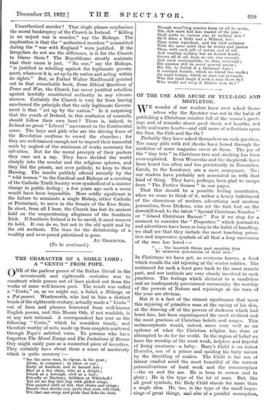THE CHARACTER OF A NOBLE LORD : A " CENTO
" FROM POPE.
ONE of the parlour games of the Italian literati in the seventeenth and eighteenth centuries was to construct whole poems out of lines picked out from the works of some well-known poet. The result was called a " Cento," or, as we might say, a Salad, a Melange, or a Pot-pourri. Wordsworth, who had in him a distinct touch of the eighteenth century, actually made a " Cento " out of lines and phrases borrowed from well-known English poems, and this Mosaic Ode, if not readable, is at any rate rational. A correspondent has sent us the following " Cento," which he considers timely, and therefore worthy of note, made up from couplets scattered through Pope's satirical verse. To persons who have forgotten The Moral Essays and The Imitations of Horace they might easily pass as a connected piece of invective. They certainly have about them a sense of modernity which is quite uncanny :—
"See the same man, in vigour, in the gout ; Alone, in company ; in place or out ; Early at business, and at hazard late ; Mad at a fox chase, wise at a debate ; Drunk at a borough, civil at a ball ; Friendly at Hackney, faithless at Whitehall I Yet let me flap this bug with gilded wings, This painted child of dirt, that stinks and stings ; Beauty that shocks you, parts that none will trust,
Wit that can creep, and pride that licks the dust.
Though wond'ring senates hung on all he spoke, The club must hail him master of the joke : Shall parts so various aim at nothing new ? He'll shine a Tully and a Wilmot, too ; Then turns repentant, and his God acclaims With the same spirit that he drinks and games. Thus, with each gift of nature and of art, And wanting nothing but an honest heart ; Grown all to all, from no one vice exempt. And most contemptible, to shun contempt ; His passion still to covet general praise ; His life, to forfeit it a thousand ways ; A constant bounty, which no friend has made ; An angel tongue, which no man can persuade. Who but must laugh if such a man there be ? Who would not weep if Atticus were he ? "










































 Previous page
Previous page